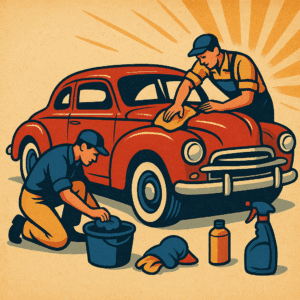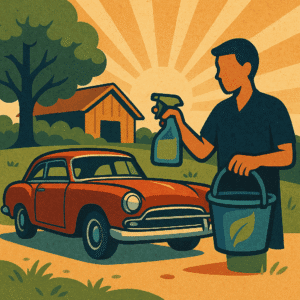Eco-Friendly Car Detailing Tips: How to Keep Your Ride Clean and Green
Looking for eco-friendly car detailing tips that’ll keep your ride shining without harming the planet? You’re in the right place, friend. These days, more folks are choosing to clean their cars with a lighter touch on Mother Earth—just like a Sunday wash at the gas station back in the good ol’ days, but smarter for today’s world.
Whether you’re prepping your classic cruiser for a road trip or just trying to keep your daily driver fresh, going green doesn’t mean cutting corners. In fact, these eco-friendly detailing tips will help your car look its best while keeping water clean, waste down, and your conscience clear.
1. Start with Biodegradable Products
The first step to eco-friendly car care is switching to biodegradable soaps and cleaners. Traditional car shampoos often contain phosphates and other harsh chemicals that can harm aquatic ecosystems when washed down storm drains. Look for plant-based formulas labeled “non-toxic” and “biodegradable.”
Brands like Chemical Guys, Mothers, and Meguiar’s now offer greener product lines that deliver great results without the environmental cost.
2. Try Waterless Car Wash Solutions
If you live in a drought-prone area or want to conserve water, waterless wash products are a real game changer. These sprays are designed to lift dirt from your paint and safely wipe it away with a microfiber towel. No hose required—and no runoff heading into the street.
They’re perfect for light dust and regular upkeep. Just remember: if your car is caked in mud, give it a rinse first so you don’t risk scratching the paint.
3. Steam Clean the Interior
One of the most effective eco-friendly car detailing tips is to use steam. Steam cleaners sanitize seats, carpets, and dashboards without the need for chemicals. It’s especially helpful if you’re dealing with stains, allergens, or odors—just a little water and heat go a long way.
Steam also reaches those hard-to-clean corners around cupholders and vents, making it a favorite tool of pro detailers who care about the environment and results.
4. Choose Microfiber Over Paper
Old-school rags and paper towels might’ve been fine back when gas was 25 cents a gallon, but now we know better. Microfiber towels are reusable, durable, and highly effective at grabbing dust, moisture, and grime. They also reduce waste and save money over time.
Be sure to wash them separately from other laundry and avoid fabric softener, which can clog the fibers.
5. Detail on Gravel or Grass to Prevent Runoff
Where you wash your car matters. Doing it on your driveway or street allows dirty water to carry pollutants directly into storm drains and waterways. Instead, wash your vehicle over a gravel or grassy surface that can naturally filter the water—or use a professional-grade water mat that collects runoff.
6. Reuse and Recycle What You Can
Eco-detailing isn’t just about cleaning products—it’s also about waste. Reuse spray bottles, recycle product containers, and properly dispose of dirty water or used filters. If you change your own oil or fluids, take them to a proper recycling center.
You can even buy refillable car cleaning products in bulk, reducing packaging waste and saving money long term.
Final Thoughts: Shine Responsibly
By following these eco-friendly car detailing tips, you’ll not only keep your car looking like it just rolled off the lot—you’ll also help protect the highways and byways we all love. Whether it’s cutting back on water use or switching to biodegradable products, every little bit makes a difference.
And if you’d rather leave the scrubbing to the pros, we’ve got plenty of environmentally-conscious detailers to choose from. Find a top-rated eco-friendly car detailer near you at AutoDetailingGuide.com and give your ride a clean you can feel good about.



